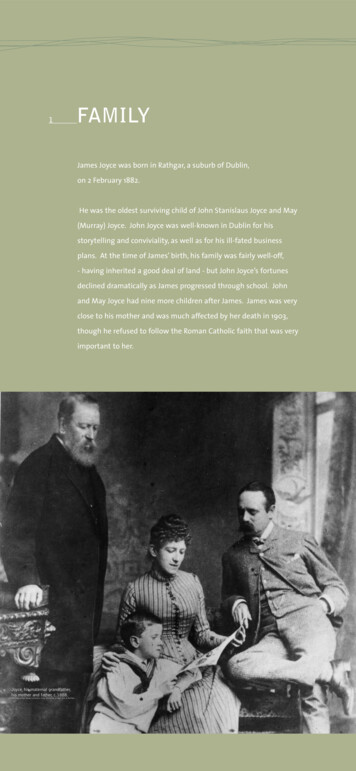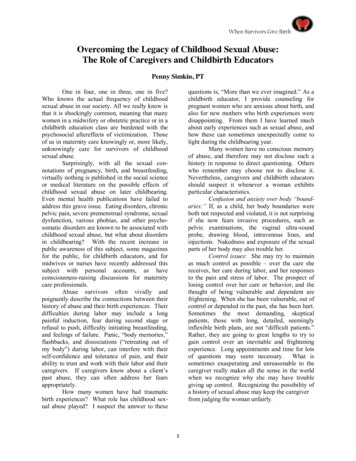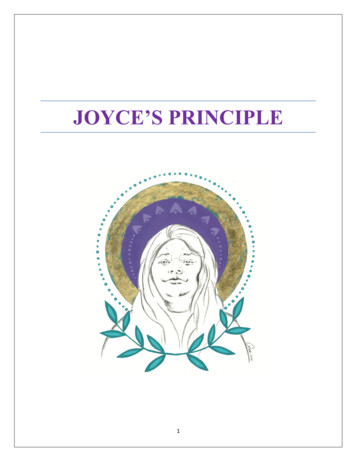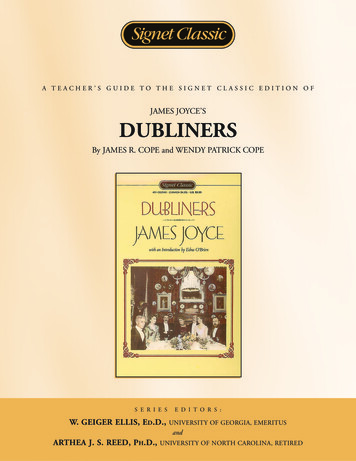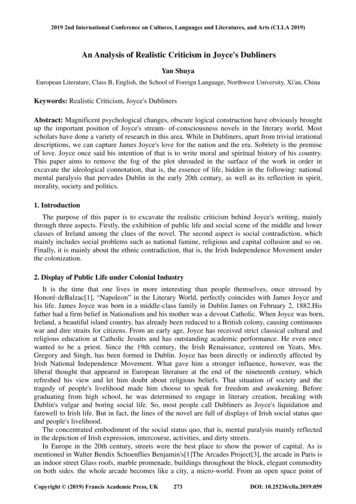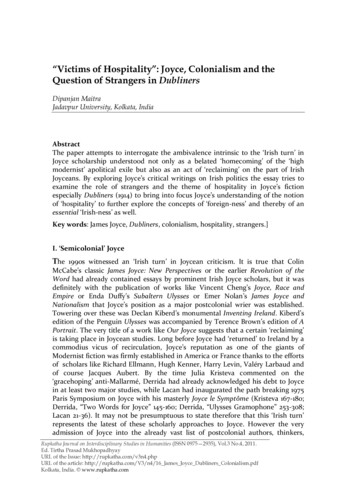
Transcription
“Victims of Hospitality”: Joyce, Colonialism and theQuestion of Strangers in DublinersDipanjan MaitraJadavpur University, Kolkata, IndiaAbstractThe paper attempts to interrogate the ambivalence intrinsic to the ‘Irish turn’ inJoyce scholarship understood not only as a belated ‘homecoming’ of the ‘highmodernist’ apolitical exile but also as an act of ‘reclaiming’ on the part of IrishJoyceans. By exploring Joyce’s critical writings on Irish politics the essay tries toexamine the role of strangers and the theme of hospitality in Joyce’s fictionespecially Dubliners (1914) to bring into focus Joyce’s understanding of the notionof ‘hospitality’ to further explore the concepts of ‘foreign-ness’ and thereby of anessential ‘Irish-ness’ as well.Key words: James Joyce, Dubliners, colonialism, hospitality, strangers.]I. ‘Semicolonial’ JoyceThe 1990s witnessed an ‘Irish turn’ in Joycean criticism. It is true that ColinMcCabe’s classic James Joyce: New Perspectives or the earlier Revolution of theWord had already contained essays by prominent Irish Joyce scholars, but it wasdefinitely with the publication of works like Vincent Cheng’s Joyce, Race andEmpire or Enda Duffy’s Subaltern Ulysses or Emer Nolan’s James Joyce andNationalism that Joyce’s position as a major postcolonial wrier was established.Towering over these was Declan Kiberd’s monumental Inventing Ireland. Kiberd’sedition of the Penguin Ulysses was accompanied by Terence Brown’s edition of APortrait. The very title of a work like Our Joyce suggests that a certain ‘reclaiming’is taking place in Joycean studies. Long before Joyce had ‘returned’ to Ireland by acommodius vicus of recirculation, Joyce’s reputation as one of the giants ofModernist fiction was firmly established in America or France thanks to the effortsof scholars like Richard Ellmann, Hugh Kenner, Harry Levin, Valéry Larbaud andof course Jacques Aubert. By the time Julia Kristeva commented on the‘gracehoping’ anti-Mallarmé, Derrida had already acknowledged his debt to Joycein at least two major studies, while Lacan had inaugurated the path breaking 1975Paris Symposium on Joyce with his masterly Joyce le Symptôme (Kristeva 167-180;Derrida, “Two Words for Joyce” 145-160; Derrida, “Ulysses Gramophone” 253-308;Lacan 21-36). It may not be presumptuous to state therefore that this ‘Irish turn’represents the latest of these scholarly approaches to Joyce. However the veryadmission of Joyce into the already vast list of postcolonial authors, thinkers,Rupkatha Journal on Interdisciplinary Studies in Humanities (ISSN 0975—2935), Vol.3 No.4, 2011.Ed. Tirtha Prasad MukhopadhyayURL of the Issue: http://rupkatha.com/v3n4.phpURL of the article: http://rupkatha.com/V3/n4/16 James Joyce Dubliners Colonialism.pdfKolkata, India. www.rupkatha.com
587Rupkatha Journal on Interdisciplinary Studies in Humanities 3.4posits a problem. As the editors of the volume titled Semicolonial Joyce MarjorieHowes and Derek Attridge point out in their introductory note, the questionseems to put forth the position of Ireland itself as a postcolonial nation: when can colonialism in Ireland be said to have ended? With the treaty of1921? The 1937 constitution? The 1949 repeal of the External Relations Act?The recent peace accord? Or some future final resolution? (Howes andAttridge 5)Joyce’s own attitude towards Ireland is of course complex if not simply ambivalent.He sounds his disillusionment with the prospect of Home Rule in an early essay in1910:The fact that Ireland now wishes to make common cause with BritishDemocracy should neither surprise nor persuade anyone. For sevencenturies she has never been a faithful subject of England. Neither, on theother hand has she been faithful to herself. (Joyce, “The Home Rule Comet”212)Joyce became the archetypal wanderer, the perpetual exile who could neverreach his Ithaca but as if to compensate for this ever-present lack always madeIreland the site of his literary experiments. While he famously defined Ireland asan ‘afterthought of Europe’ (Ellmann 67) as a centre of paralysis and xenophobicnationalism whose snares the artist must avoid to create the uncreated conscienceof his race there is inevitably an acknowledgment of all that is Irish as essentiallyhis own, to quote Stephen Dedalus ‘Ireland must be important because it belongsto me’ (Joyce, Ulysses 527). It is this deeply ‘egoistic’ (to echo Rabaté’s rereading ofthe term in James Joyce and the Politics of Egoism) relation to his nation thatperhaps made him recreate 16th June 1904, Dublin in such a way so that if ‘it wereto disappear’ from the face of the earth the book would help to reconstruct it fromscratch. In Dubliners for instance Joyce’s conscious effort is to give this ancientcapital of Christendom the legitimacy that it lacks (Rabaté 24-42). Joyce’s ‘polishedlooking glass’ may not have pleased his countrymen but Joyce’s concerted effort iscertainly an act of ‘reclaiming’. The notorious figure of the ‘stage Irishman’ was nodoubt not unknown to him and his description of the Irish as a ‘gentle race’ issurely an attempt to ‘set the records straight’. It is this same distrust of theforeigner’s discourse on Ireland, on Irish fiction that Joyce’s Irish readers oftenshare with him. Declan Kiberd, himself a student of Richard Ellmann while payinghomage to his former tutor at Oxford can not help notice Ellmann’s reluctance inadmitting the centrality of Ireland and Irish fiction to Joyce’s work. Kiberd feels adistinct unease to see Ellmann’s feelings towards Ireland:While he loved Irish people as individuals, the plain truth was that he didnot particularly like Ireland. (Kiberd 240)
588 “Victims of Hospitality”: Joyce, Colonialism and the Question ofStrangers in DublinersIn the same essay, Kiberd quotes Patrick Kavanagh’s poem, ‘Who killed JamesJoyce?’:Who killed James Joyce? / I, said the commentator, / I killed James Joyce/For my graduation. What weapon was used / To slay mighty Ulysses? / Theweapon that was used / Was a Harvard thesis. (236)But the question is not simply that of foreign scholars ‘killing’ Joycedeliberately obliterating his Irishness claiming, that to be modern was to somehowtranscend national borders and to be at home amidst perfect strangers. It isperhaps this ambivalence that poses the problem for Attridge and Howes. ForJoyce, it is not simply a matter of imperialist Britain performing acts ofepistemological violence, annihilating Ireland’s Gaelic past to simply incorporateall Ireland into a hegemonic discourse of the British nation. Joyce unhesitatinglyagrees that it is the Irish themselves who have admitted the invaders into theirland. It is the host himself who has admitted, indeed invited the stranger like BuckMulligan allowing Haines to stay in Martello Tower:But the fact is that the English came to Ireland at the repeated requests of anative king, [Dermot MacMurrogh, King of Leister] without, needless tosay, any great desire on their part, and without the consent of their ownking, but armed with the papal bull of Adrian IV and a papal letter ofAlexander In addition, there is the fact that parliamentary union [the actof union of 1800 between England and Ireland] was not legislated atWestminster but at Dublin, by a parliament elected by the vote of thepeople of Ireland, a parliament corrupted and undermined with the greatestingenuity by the agents of the English prime minister, but an Irishparliament nevertheless. From my point of view, these two facts must bethoroughly explained before the country in which they occurred has themost rudimentary right to persuade one of her sons to change the positionfrom that of an unprejudiced observer to that of a convincednationalist.(Joyce, “Ireland, Island of Saints and Sages” 162)This lecture delivered in Trieste, contains allusions to many famous Irishmen Wilde, Shaw, Swift among others and also three ‘heresiarchs’ John Duns Scotus,Macarius and Vergilus Solivagus. There is also the memory of cultured, ancientCeltic, Scandinavian pasts, a civilization far advanced. But this is also accompaniedby a wry admission of one’s own guilt and the futility of thinking about a pristine,untainted ‘Irish’ race: to tell the truth, to exclude from the present nation all who aredescended from foreign families would be impossible, and to deny thename of patriot to all those who are not of Irish stock would be to deny itto almost all the heroes of the modern movement (162-163)
589Rupkatha Journal on Interdisciplinary Studies in Humanities 3.4II. Strangers and HospitalityUlysses therefore becomes the great novel about hospitality LeopoldBloom, Jew, middle aged, ‘safe man’ offering shelter to wanderer TelemachusStephen. And yet Stephen has to refuse, he can not stay all night. Bloom’s searchfor a lost son (his son Rudy died in his infancy) is counterbalanced by Molly’sbizarre fantasies of seducing Stephen. In Dubliners, the question of strangers canbe raised somewhat differently. Joyce claimed that Dublin was a small city whereeveryone knew everyone else. As Raymond Williams explains in The Country andthe City:Most novels are in some sense knowable communities. It is part of atraditional method an underlying stance and approach that the novelistoffers to show people and their relationships in essentially knowable andcommunicable ways. (Williams 165)The Joycean project of claiming to know all of Dublin so as to present a ‘polished’looking glass to its citizens repeatedly encounters inassimilable strangers andenigmas. In other words it constantly refuses what Williams accused George Eliotof –‘she finds it difficult to individuate working people –falling back on a choralmode, a generalizing description. It is this ‘choral mode’ that is impossible toachieve’ (165-169).As Duffy has shown, Joyce’s minute depiction of the Dublin of 1904 wasdeliberately not a complete picture. It did not, could not represent everything foreveryone, as James Fairhall points out slum-dwellers or the Anglo-Irish. Howeveras Fairhall concludes such exclusions may not necessarily mean a complete elision.For example the overarching ‘shade’ of Parnell does not completely overshadowthe socialism of James Connolly in “Ivy Day at the Committee Room” (Fairhall 1163). Duffy on the other hand contends that the Dublin of 1904 was fastdisappearing after the Easter Rising of 1916 and the guerrilla War of Independenceof 1919-21 with many of its sites bombed and disfigured (Duffy 37-57). One needs tore-examine how Joyce’s discourse on strangers in Dubliners is inevitably shaped bypolitics of gender and representation. As we shall see this can not bypass theethical dimension either.III. Hospitality in Dubliners“Eveline” has received a fair amount of attention from essentially two quarters thefirst, amongst which Hugh Kenner is one, argues that Eveline’s decision at theNorth Wall, not to elope with Frank to Buenos Ayres is a result of her laterealization that Frank is a swindler who was about to take her to Liverpool and sellher (Kenner 19-28). Garry Leonard argues on the other hand that her decisionarises out of a dilemma to escape the fate of her mother (who is mentallyderanged) to seek an ‘elsewhere’ or to obey her mother’s desire to keep her ‘home’together (Leonard 23-41). Eveline might well be caught up in the web of her
590 “Victims of Hospitality”: Joyce, Colonialism and the Question ofStrangers in Dublinersmother’s desire, Mrs. Hill’s incomprehensible, delirious last words that encourageEveline to leave in the first place. But as Katherine Mullin argues persuasively tosuggest that Eveline’s decision may have been a reflection of Joyce’s subtlesubversion of the nationalist propaganda against emigration propagated by theIrish Homestead (where “Eveline” appeared in 1904). As Mullin shows, Joyce’smotive behind making Buenos Ayres as a potential ‘elsewhere’ may have been thecity’s dubious reputation at the turn of the century as a centre of White Slavetrade. While the popular press constantly emphasized the damaging effects ofemigration – both cultural and sexual, Argentina at this time was a place where thecolonized Irishman could shed his colonial past and become a prosperous planter‘mastering the unplanted terrain of the Pampas’ (Mullin 175). By1904 the numberof Irish emigrants to this ‘land of opportunity’ had dwindled to zero preciselybecause of the anxieties about the slave trade. What “Eveline” reflects therefore isnot only Joyce’s assertion that there is no utopic ‘elsewhere’ for Eveline where shecan escape her father’s rod and patriarchal violence but that the seducer does notnecessarily have to be an absolute outsider. It is the stranger who resides withinwho can equally seduce and betray a colonized, economically exploited lowermiddle class Irishwoman utilizing tales about ‘distant countries’ and liberation.What Joyce achieves is a subversion of the common notions about the securities ofa private space and a ‘home’. The word ‘home’ occurs about ten times within fivepages in the story (Joyce, “Eveline” 37-41).“An Encounter” presents yet another tale about Joyce’s introspection ofoutsiders in the city. Two boys, the narrator and a boy named Mahony go out onan adventure around the city. The narrator who reads detective stories and‘chronicles of disaster’ about the Wild West at school because ‘they opened doorsof escape’ is also constantly hungry of ‘wild sensations’. Wanting ‘real adventures’he decides to venture out because they ‘do not happen to people who remain athome’ (Joyce, “An Encounter” 20). After hours of fruitless and aimless wanderingacross Dublin North Strand Road, the Ringsend, the Liffey in the ferryboat, thetwo become tired and rest on a field. The boy narrator who had always imaginedthat sailors had green eyes is disappointed to find sailors to be as ordinary as mencan be. In short there has been no ‘real adventure’ no ‘wild sensation’ no sense ofestrangement that the narrator had been seeking eagerly. His fantasy of escapeseems completely frustrated at this point.It is then that the two meet a pervert, possibly a homosexual known tomany in Joyce’s Dublin. An old man, he tells them tales about young girls andfinally about boys being whipped. His sadistic pleasure at torture comes as a shockto the narrator. He finally notices that the man has ‘bottle-green’ eyes. Throughthe image of these ‘green eyes’ Joyce suggests that it is this absolute sexual Otherthat he had been both tempted and frightened to ‘encounter’. Instead of an escapehe feels almost enmeshed into the hypnotic thrill of the stranger’s narrative. Theold man wickedly parodies the boys’ own aimless wandering in a circle in his veryact of story-telling:
591Rupkatha Journal on Interdisciplinary Studies in Humanities 3.4He gave me the impression that he was repeating something which he hadlearned by heart or that, magnetized by some words of his own speech, hismind was slowly circling round and round in the same orbit. (26)Or even later:His mind, as if magnetized again by his speech, seemed to circle slowlyround and round its new centre. (27)The old man finds pleasure and sexual fulfillment by this retelling of his fantasieswhile the boy narrator sees his own fantasy of escape being mirrored in thestranger’s articulation. This moment of absolute incomprehension and anxietyproduces a profound sense of alienation in the boy’s mind. The last line of thestory is thus heavy with implication. He now feels estranged from Mahoney, hisfriend with whom he had sought escape and who now rushes to ‘offer aid’ toprotect him from the old man. He feels guilty but ultimately acknowledges thepainful truth that he had always concealed from himself: “And I was penitent; forin my heart I had always despised him a little.” (28)Mahoney was always a stranger to him. This encounter produces a momentof rupture in his mind not only with the world but also with himself.“Clay” on the other hand looks at the other side of the problem, from thepoint of view of Maria, an old unattractive spinster, who is almost an ‘invisiblewoman’ in Dublin. Maria works as a scullery maid at Dublin by Lamplight which asGifford points out was a Protestant institution for ‘Fallen Women’ (Gifford 77). AHalloween story, “Clay” shows Maria’s pathetic attempt to bring gifts to please thehousehold of Joe. Margot Norris has shown that the ‘deceptively simple’ nature ofthe narrative technique conceals the way Maria is perceived by others. Mariablushes when prospects of marriage are discussed even in passing by a ‘stylishyoung’ shop girl at a cake shop (Norris 206-215). There are repeated references tothe absolute invisibility of Maria as she walks across the city. The young men onthe tram fail to notice her and she does not get a seat:She thought she would have to stand in the Drumcondra tram becausenone of the young men seemed to notice her the young men who simplystared straight before them. (Joyce, “Clay” 114)The only man who offers her a seat is an old drunkard who steals her cake whichshe had purchased for the children while only pretending to take interest in her.Norris argues that the reader is strangely made blind to the way Maria is greeted atJoe’s household. One is not sure whether they are weary or even irritated by herpresence. The children play pranks on her and at the little divination game theyforce Maria to choose clay, the symbol of death. The silence followed by ‘a greatdeal of scuffling and whispering’ (117) that greets Maria’s choice is strangelyambiguous. The reader like Maria is also under a blindfold. Clay, symbolizingdeath, once again breaks the boundary between the outside and the inside worldin the story. Clay, brought from the garden, outside, almost becomes a piece of
592 “Victims of Hospitality”: Joyce, Colonialism and the Question ofStrangers in Dublinersnature that threatens to collapse the inner, private room of the household asymbol of culture. The theme of an intrusion is of course already played overMaria’s entry into the house. What is deeply disturbing about the narrativestrategy in the story is the way Maria is described by the author: Maria was a very, very small person indeed, but she had a very long noseand a very long chin. In spite of its years she found it a nice tidy little body. when she laughed her grey-green eyes sparkled with disappointed shynessand the tip of her nose nearly met the tip of her nose Maria laughed and laughed again till the tip of her nose nearly met the tipof her chin. .She talked a little through her nose, always soothingly: ‘Yes, my dear,’ and‘No, my dear.’ (110-118)Like the word ‘clay’ the word ‘witch’ is never mentioned in this Halloweenstory but the hints are only too insistent to be ignored. The anxiety about thepresence of strangers, outsiders, absolute Others and ‘invisible women’ nowbecomes almost metaphorical. Maria becomes the witch, whose ominous presenceforcibly brings back the uncomfortable question of death and complete disruptionof communal harmony at the feast. She becomes identified with that very figure,that evil-spirit whose presence the feast wishes to obliterate. She is that stranger,whose entry the house was supposed to prevent.There are numerous such ‘ghosts’ in the Dublin of Ulysses as well Wetherup, Miss Dunn and of course the mystery man of the novel, the flâneurM’Intosh. The identity of M’Intosh has generated an enormous amount ofspeculation and critical commentary. Enda Duffy identifies him as Michael Collinshimself, the leader of the War of Independence, a wanted man who nevertheless‘crisscrossed the city in civilian clothes’ (Duffy 66). Significantly however, M’Intoshremains a stranger he always was in the novel. He haunts Bloom’s thoughts atnight and appears only to disappear in Hades and Circe, while claiming to know allabout Bloom. Such strangers keep on crisscrossing the civilian space of the city inDubliners, and who as Vincent Cheng argues, form: the other as the constructed product of an imagined and absolutedifference from the self, a discursive repository of all that is repugnant to theself, and whose very presence within the self is denied and repressed inorder to construct the self’s own self image and subjectivity; such a processrepeatedly figures the other as primitive, primitive, barbaric, bestial,sexually rapacious, stupid, and so on – in the manner in which the Englishconstructed the Irish (as well as other “races” ) during the nineteenthcentury. (Cheng 78)Cheng and Fairhall both show how after the rebellion, after the PhoenixPark murders, the English process of simianization of the Irish that was already old
593Rupkatha Journal on Interdisciplinary Studies in Humanities 3.4was in full swing-newspaper cartoons for example repeatedly portrayed the Irish asapish; primates who are uncontrollable and like children need to be disciplined.(Source: .html)It is also in this sense as Kiberd argues, that Ireland was England’s unconscious(Kiberd 9-25, 327-355). The stereotypes comprised a veritable list of incompatibles– a grossly ‘feminized’ passive people who could grow turbulent at the same time.David Lloyd quotes Matthew Arnold on the ‘Celtic mind’:The Celt, undisciplinable, anarchical, and turbulent by nature, but out ofaffection and admiration giving himself body and soul to some leader, thatis not a promising political temperament, it is just the opposite of theAnglo-Saxon temperament, disciplinable and steadily obedient withincertain limits (Lloyd 134)
594 “Victims of Hospitality”: Joyce, Colonialism and the Question ofStrangers in Dubliners“The Irish Frankenstein,” Punch, 20 May 1882(source: http://en.wikipedia.org/wiki/File:Punch AntiIrish propaganda %281882%29 Irish Frankenstein.jpg)What often follows as a ‘fitting reply’ is the production of a nationalist counterstereotype, a figure marked by hyper masculinity. Such projects in Joyce’s writingsappear to be either doomed from the start or followed by an almost unconsciousidentification with the colonizer. Such is the figure of the Citizen in Cyclops, oneeyed and one might say a monocular xenophobe to be juxtaposed with Bloom, thefeminized ‘safe man’ as Davy Byrne calls him in ‘Lestrygonians’ (Joyce, Ulysses146). Little Chandler in A Little Cloud fails repeatedly to hide his own inadequacyand impotency coming face to face with Gallaher, his friend who has made it ‘big’in London. His self projected portrait of a talented mind is shattered to reveal hishelplessness as a father who is powerless to deal with his own child. Gabriel in TheDead is perhaps the best example of it.
595Rupkatha Journal on Interdisciplinary Studies in Humanities 3.4The Dead in many ways as the concluding piece to the collection sums upmany of the recurrent motifs of the earlier stories. According to Ellmann, this isone of Joyce’s most personal stories, dealing with one of the most painful episodesof his own life (Ellmann, “The Backgrounds of TheDead” 243-253). The story hasbeen read in various ways largely as a series of three encounters of Gabriel withthree women Lily, Molly Ivors and his wife Gretta that slowly, forcibly make himconfront his own failures and frailties. What lies at the heart of the story of course,is the feast and Gabriel’s speech.Gabriel according to Molly is a West Briton, who writes book reviews forthe conservative daily, The Daily Express. Gabriel, easily the most ‘accomplished’ ofthe Morkans’ guests because of his superior upbringing, his education, even hisattire, his ability to quote Browning, carve a goose is once again at a loss. He cannot think of a ‘grandiose phrase’ to counter her argument. Gabriel wishes toseparate the politics supported by his newspaper from his own stance towardnationalism, arguing that ‘literature was above politics’ (Joyce, “The Dead” 214).Gabriel knows that he could not be further from the truth and once again stayssilent.The conflict between the nationalist, revivalist Molly and the ‘liberal’Gabriel is brought out brilliantly at the dance scene. The annual dance wassupposed to emphasize harmony and synthesis at the house but it has the oppositeeffect in this scene. Molly tells him to ‘cross’ but what takes place is a ‘crossexamination’ where they both speak at cross purposes bringing out the absolutelack of communication and incompatibility between them. Molly asks him to visitthe Aran Isles, near the west coast. Gifford tells us that ‘The properly patriotic IrishRevivalist regarded the Isles as an Irish utopia since the natives still spoke Irish andlived in what was sentimentally regarded as true Irish fashion (i.e., in eighteenthcentury poverty and superstition)’ (Gifford 117). Gabriel refuses and promises totake a tour of Europe instead. He refuses to acknowledge that Gretta, his wife isalso from Connacht and very much wishes to visit Galway. Questioned about hisallegiance to his own language Gabriel flatly refuses to call Irish his own. But asbefore, he fails to come up with an explanation. Molly’s presence makes himuncomfortable and although he refuses her offer to visit the Isles, he isnevertheless reminded of Gretta’s origin that made his own family call her ‘countrycute’ (Joyce, “The Dead” 213). To counter it Gabriel has recourse to his speech,carefully prepared and which he now alters slightly to incorporate his attack. Thedinner itself like Gabriel’s speech is marked by an excess, a remarkable excess offood items that is not only striking but somewhat misplaced. Critics have observedthat what lurks behind this expression of solidarity and bounty is always the ghostof the Great Potato Famine of 1846-51 that destroyed about 30% of the populationat certain counties killing 700,000 people. Bonnie Roos in her article reads theepisode along with the Bret Harte’s novel Gabriel Conroy (which provided Joycewith his protagonist’s name) and the centrality the novel grants to the Famine(Roos 99-126). The juxtaposition of starvation and festivity and cannibalism and
596 “Victims of Hospitality”: Joyce, Colonialism and the Question ofStrangers in Dublinersgluttony (an allusion to Dante’s Inferno,33), seems to mark for her the hiatus inIrish writing that Terry Eagleton identifies as between ‘the experience it has torecord, and the conventions available for articulating it’ (qtd. in Roos 99-126). Thefeast is also related to the theme of expenditure and a certain degree ofwastefulness that entails the question of hospitality. In After the Race for instance,Joyce begins to explore the question of unconditional hospitality. In that story,Jimmy is too excited to refuse his companions to his house. What follows is a boutof drinking and gambling. Jimmy becomes the ‘greatest loser’ at the game. Herealizes that ‘he would regret in the morning, but at present he was glad of therest, glad of the dark stupor that would cover up his folly’ (Joyce, “After the Race”51). He realizes at last the risk involved in offering unconditional hospitality butonly too late. Gabriel makes the same mistake at the after dinner speech.Gabriel himself posits the question of hospitality as his first priority:He ran over the headings of his speech: Irish hospitality, sad memories, TheThree Graces, Paris, the quotation from Browning. it is not the first time that we have gathered together under thishospitable roof around this hospitable board. It is not the first time that wehave been the recipients –or perhaps the victims –of the hospitality ofcertain good ladies. our country has no tradition which does it so much honour and which itshould guard so jealously as that of its hospitality. the tradition of genuine warm-hearted courteous Irish hospitality, whichour forefathers have handed down to us (Joyce, “The Dead” 231-232)Gabriel answers Molly’s ‘hypereducation’ with the ‘virtue’ of absolute hospitalitythat invites, incorporates everything. Gabriel even identifies it as the Irish virtue.Gabriel’s collapse is complete when he pretends to share Gretta’s past whileremaining rooted to his own liberal, bourgeois European upbringing. Grettabecomes once more linked to her marginalized, primitive, rural Galway through anIrish melody The Lass of Aughrim. It is Gabriel’s error to even try to intrude into it.He discovers Gretta’s still deep love for the long dead Michael Furey and hiscomplete inaccessibility to that memory. His delusion about his wife’s past, hisinadequacy, his failures at the party all become identified with this moment: he saw himself a ludicrous figure, acting as a pennyboy for his aunts thepitiable fatuous fellow (Joyce, “The Dead” 251)As the ghost of this alien, who died for Gretta invades his life, he feels:A vague terror seized Gabriel some impalpable and vindictive being wascoming against him, gathering forces against him in its vague world. (252) His soul had approached that region where dwell the vast hosts of thedead. He was conscious of, but could not apprehend, their wayward andflickering existence. His own identity was fading (255)
597Rupkatha Journal on Interdisciplinary Studies in Humanities 3.4Gabriel realizes that this past is unalterable. He, the educated ‘West Briton’ whowrites in English can not re-write this hidden, unconscious past that is so muchabout his own country. Gretta’s past after Gabriel’s invitation becomes Gabriel’spast as well. Gabriel thus decides to go west, that very space that he had declinedto explore earlier to revisit his own subaltern past. He can not fathom it, it isincalculably alien to him and yet he must acknowledge it, as Dipesh Chakrabartywrites:The supernatural can inhabit the world in these other modes and notalways as a problem or conscious belief or ideas gods and spirits are notdependent on human beliefs for their own existence, what brings them topresence are our practices. They are parts of the different ways of beingthough which we make present manifold: it is precisely the disjunctures inthe pre
especially Dubliners (1914) to bring into focus Joyce's understanding of the notion of 'hospitality' to further explore the concepts of 'foreign-ness' and thereby of an essential 'Irish-ness' as well. Key words: James Joyce, Dubliners, colonialism, hospitality, strangers.] I. 'Semicolonial' Joyce
